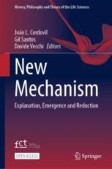Search
Search Results
-
Constitutive relevance & mutual manipulability revisited
An adequate understanding of the ubiquitous practice of mechanistic explanation requires an account of what Craver (J Philos Res, 32:3–20, 2007b)...

-
The New Mechanistic Theory of Explanation: A Primer
In this chapter, I introduce the new mechanistic framework of explanation, focusing in particular on constitutive mechanistic explanation. I evaluate...
-
Anatomy’s role in mechanistic explanations of organism behaviour
Explanations in behavioural neuroscience are often said to be mechanistic in the sense that they explain an organism’s behaviour by describing the...

-
Teleosemantics
In this chapter, I argue that representational contents based on teleosemantics cannot be explanatorily relevant in constitutive mechanistic...
-
Situated Cognition Research Methodological Foundations
This volume assembles supporters and critics of situated cognition research to evaluate the intricacies, prerequisites, possibilities, and scope of a...
-
Different Types of Mechanistic Explanation and Their Ontological Implications
One assumption of the new mechanistic approach is that there are two kinds of mechanistic explanations: etiological and constitutive ones. While the...
-
Extended Cognition and the Search for the Mark of Constitution – A Promising Strategy?
The disagreement between defenders and opponents of extended cognition is often framed in terms of constitution. The underlying principle of this...
-
Dissolving the Causal-Constitution Fallacy: Diachronic Constitution and the Metaphysics of Extended Cognition
This chapter questions the causal-constitution fallacy raised against the extended mind. It does so by presenting our signature temporal thesis about...
-
A mechanistic guide to reductive physicalism
Causal mediation mechanisms are well supported by available experimental evidence and provide a practicable way to reductive physicalism. According...

-
Why Diachronic Constitution Won’t Help. Commentary on “Dissolving the Causal-Constitution Fallacy”
In this short commentary, I will first show why Kiverstein & Kirchhoff's (this volume) analysis of the CC-fallacy is inadequate in an important way...
-
How and when are topological explanations complete mechanistic explanations? The case of multilayer network models
The relationship between topological explanation and mechanistic explanation is unclear. Most philosophers agree that at least some topological...

-
Representations and Mechanisms Do Not Mix
In this chapter, I outline an argument against explanatory relevance of neural representations. After clarifying the concept of neural representation...
-
Indicator Contents
In this chapter I argue that indicator contents cannot be explanatorily relevant in constitutive mechanistic explanations of cognitive phenomena. The...
-
Structural Contents
In this chapter, I argue that contents of structural representations cannot be explanatorily relevant in constitutive mechanistic explanations of...
-
Mechanistic Explanatory Texts
In this chapter, I address the question how mechanistic models provide why-explanations. I argue for a contrastive approach to mechanistic...
-
Flat mechanisms: a reductionist approach to levels in mechanistic explanations
The mechanistic framework traditionally comes bundled with a multi-level view. Some ascribe ontological weight to these levels, whereas others claim...

-
A Defence of Manipulationist Noncausal Explanation: The Case for Intervention Liberalism
Recent years have seen growing interest in modifying interventionist accounts of causal explanation in order to characterise noncausal explanation....
-
From psychiatric kinds to harmful symptoms
Much research in the philosophy of psychiatry has been devoted to the characterization of the normal and the pathological. In this article, we...
-
The Constitution-Turn and Extended Conscious Mind
This chapter analyses the lively, ongoing debate at the intersection of philosophy of mind and philosophy of science about the causal–constitution...
